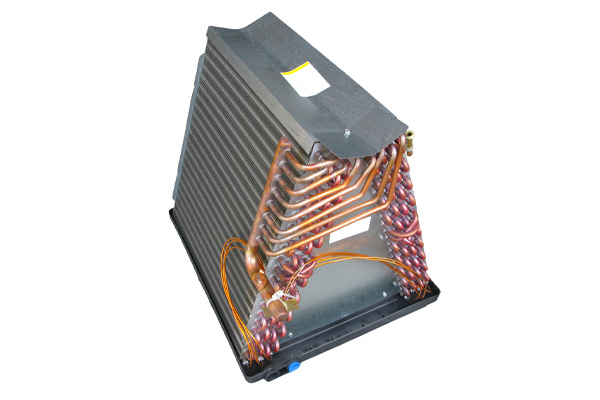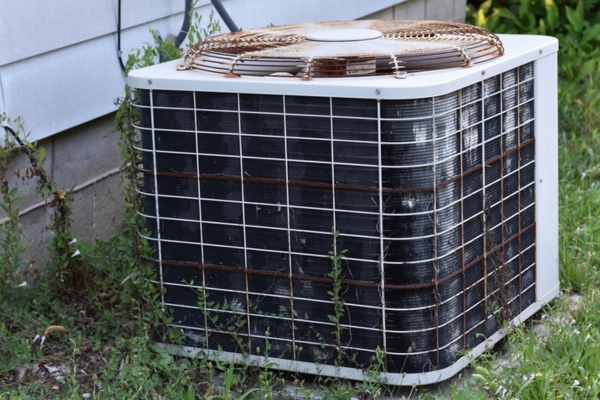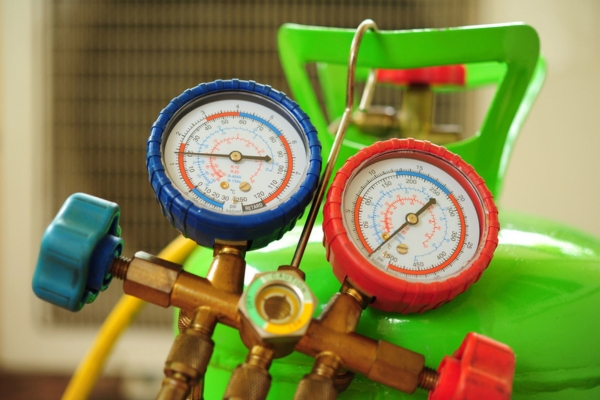Air Conditioner Condenser Vs Evaporator Coils: Key Differences

Air conditioning units elevate indoor comfort. It’s not by producing cold air but by employing the concept of heat exchange. They remove the warm air from an indoor environment and expel it outdoors. This cooling process is facilitated through the synchronized operation of two critical components: the condenser coils and the evaporator coils. While they may look similar, in the debate of condenser vs evaporator coil, these coils fulfill distinct roles. In the air conditioning cycle, each element is counteracting to reduce indoor temperatures effectively.
In this article by Miller Oil Company, we will delve into the unique roles of the condenser and evaporator coils, providing insights into how each contributes significantly to the overall efficiency of the air conditioning system.
Understanding Distinct Roles of AC Condensers & Evaporator Coils
Contents

Central air conditioning units consist of indoor and outdoor units linked by conduits that transport refrigerant. This refrigerant is essential for the cooling mechanism due to its capacity to absorb substantial amounts of heat and shift from a gas to a liquid as pressure varies. When activated, this refrigerant moves between the two units, enabling heat transfer. The essential functions of the condenser and evaporator coils center around controlling these state changes of the refrigerant to move heat efficiently.
Don’t let a malfunctioning AC unit ruin your home’s comfort. Contact Miller Oil Company for fast and reliable air conditioner maintenance and repair services.
The Evaporator Coil in the Air Conditioning System
Located within the indoor unit, the evaporator coil features copper tubes that transport extremely cold refrigerant. When the system’s blower draws warm indoor air across these coils, the refrigerant efficiently absorbs the heat from the air. Concurrently, the air’s water vapor condenses upon the cold coils, effectively lowering humidity. This dual action cools and dries the air, which is then recirculated by the blower back into the space, significantly improving the comfort level for the occupants.
Once it exits the evaporator coil slightly warmer than when it entered, the refrigerant travels via an insulated conduit to the outdoor unit. This unit, a substantial cabinet, contains the compressor and condenser coils. The refrigerant is pressurized inside the compressor, which significantly elevates its temperature. This superheated condition optimizes the efficiency with which heat is transferred from the refrigerant to the outside air, crucially supporting the air conditioning cycle.
The Air Conditioner Condenser Coil
Constructed similarly to the evaporator coil in terms of design and material, the condenser coil in the air conditioning system serves a contrasting purpose. The evaporator coil absorbs heat, whereas the condenser coil’s role is to expel that heat outdoors. This cycle of absorbing and releasing heat persists until the air conditioner reaches the temperature dictated by the thermostat setting. Throughout this process, the gentle hum of the compressor and fans typically signals that the system is actively working.
As the hot refrigerant vapor releases heat to the environment, it cools and reverts to a liquid state. This transition is facilitated by a fan within the outdoor unit, which propels air across the condenser coil to boost the heat discharge. Now in liquid form, the refrigerant is ready to cycle back to the evaporator coil in the indoor unit. It flows through an expansion valve, which vaporizes and cools it once more, preparing it to absorb heat efficiently in the next cycle.
Enhancing Air Conditioning Efficiency with Compatible Coils

It is essential to ensure the compatibility of air conditioner condensers and evaporator coils to maximize the efficiency and extend your AC’s lifespan. Using mismatched components can result in inefficiencies, elevated operational costs, and even potential system breakdowns. When replacing or upgrading components, match the size, capacity, and refrigerant type of the condenser and coils to optimize heat transfer and overall system performance.
Manufacturers typically recommend specific pairings that have been tested for optimal efficiency. Consulting with HVAC experts or following manufacturer guidelines is advisable to ensure your system functions effectively, enhancing comfort and energy efficiency.
Experiencing air conditioner issues? Let the certified technicians at Miller Oil Company provide you with top-notch repair solutions. Reach out to our experts today!
Maintenance of Cooling System Coils
Maintaining your air conditioning unit at peak efficiency necessitates routine evaporator and condenser coils maintenance. Ensuring these components remain in top condition doesn’t demand extensive labor—just a yearly inspection and tune-up by a certified HVAC professional.
During this service, the technician will focus on the coils while examining other components to confirm the system’s overall functionality. This includes a detailed assessment based on a standard maintenance checklist for air conditioning systems designed to enhance energy efficiency and prolong the system’s life.
Extend the life of your air conditioning unit with professional maintenance from Miller Oil Company. Book your appointment now!
Typical Issues with Air Conditioner Coils
Air conditioner coils are crucial for efficient system operation, yet they can experience several common problems, including:
AC Unit Coil Corrosion

Although evaporator coils are generally made from corrosion-resistant materials like copper and aluminum, they are not entirely immune to corrosion and pitting as time passes. This degradation can lead to the development of tiny holes and cracks that might not be immediately visible but can drastically affect the system’s efficiency.
Such damage allows the refrigerant to escape, potentially releasing harmful substances into the environment and reducing the system’s heat absorption capabilities due to decreased refrigerant levels. HVAC technicians can detect and mend these leaks and recharge the system with new refrigerant to ensure restored efficiency and safety.
Dirt Accumulation & Your Air Conditioning System
Dust and airborne particles that enter the air conditioning system can accumulate on the coils, creating an insulating barrier that severely impedes heat transfer efficiency. This layer of insulation restricts the coils from effectively absorbing and dissipating heat.
As a result, the system’s fans are compelled to run longer to reach the desired temperature, which increases wear on the components and leads to higher energy usage. This inefficiency inevitably results in increased energy costs. Regular maintenance and thorough cleaning of the coils are essential to avoid this issue.
Air Conditioner Mold Growth
The dark, damp conditions inside indoor air conditioning units, exacerbated by the lack of sunlight, provide a perfect breeding ground for mold and mildew. This environment facilitates the proliferation of these fungi within the system and can lead to their spread throughout a building via the ductwork. The presence of mold significantly compromises indoor air quality and can pose health risks to occupants. Mold growth can obstruct airflow by clogging the evaporator coil fins, diminishing the system’s efficiency.
Debris in the Outdoor AC Unit
The air conditioning outdoor unit is particularly vulnerable to debris, such as dry leaves, twigs, and other outdoor waste materials. This debris can collect at the bottom of the unit, blocking airflow to the condenser coil and hindering the efficient expulsion of heat from the refrigerant into the surroundings. To prevent this problem, it’s practical to maintain a clean area around the unit to discourage vegetation growth and ensure regular cleanings.
Refrigerant Issues in Air Conditioners

A noticeable drop in the cooling efficiency of an air conditioner might often be due to inadequate refrigerant levels. The system requires a precise amount of refrigerant to absorb and release heat from the environment effectively. Insufficient levels can cause the system to underperform in cooling the space, potentially leading to the coils freezing and subsequent system shutdowns. This can be particularly troublesome during warmer months, resulting in uncomfortably high indoor temperatures. If refrigerant issues are suspected, engage an HVAC technician to diagnose and rectify the problem, restoring optimal functionality and comfort levels in your home.
Conclusion
Air conditioners skillfully manipulate heat to sustain a cool indoor climate, depending on refrigerant circulated through two crucial components: the evaporator coil, which removes heat from the inside, and the condenser coil, which releases it outdoors. In the condenser vs evaporator coil comparison, these coils operate in unison to create the intended cooling effect. For optimal system efficiency, it is vital to recognize and promptly address any issues with the coils. Arranging for regular annual maintenance with a qualified HVAC technician is crucial in averting typical problems and maintaining the longevity and performance of your air conditioning system.
Contact Miller Oil Company for Comprehensive HVAC Solutions
In the Greater Enfield, Connecticut area, Miller Oil Company stands out for delivering premier heating and cooling solutions. Our team comprises highly skilled, professionally certified technicians committed to providing exceptional HVAC services, including tune-ups, repairs, installations, and replacements. With deep knowledge and extensive experience, our professionals ensure your HVAC system receives the expert care it deserves.
Miller Oil Company is dedicated to delivering unmatched value, offering the region’s most competitive prices for heating and cooling services. Our maintenance services can boost your comfort and energy efficiency, substantially reducing your heating and cooling costs. Whether you need an HVAC repair or a new system, we can guide you toward the perfect solution for your needs and budget.
We stand behind our work with a comprehensive satisfaction guarantee. Call Miller Oil Company today to schedule an appointment and receive a complimentary in-home estimate.
To schedule a service appointment, contact Miller Oil Company today. We also offer free, in-home estimates. Click the link to view our service area.

Related Articles: